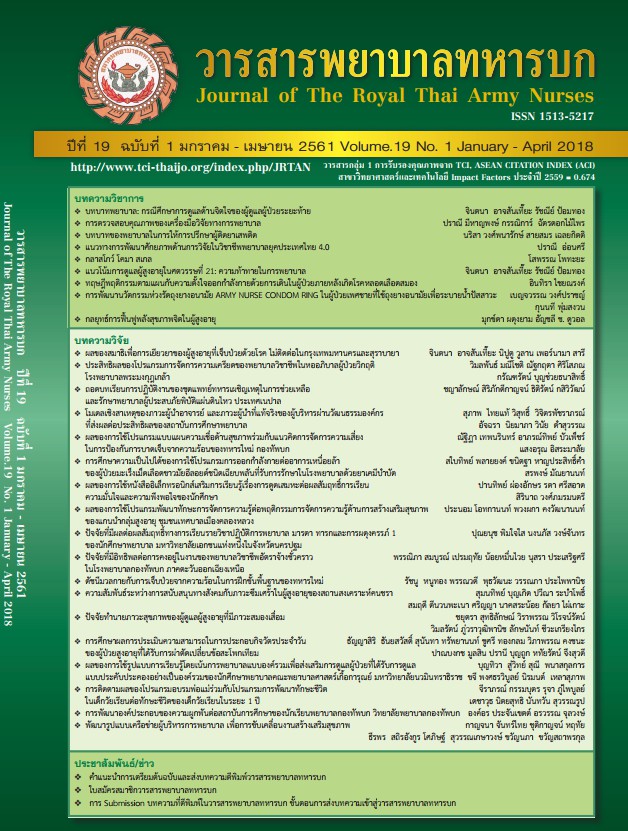ทฤษฎีพฤติกรรมตามแผนกับความตั้งใจออกกำลังกายด้วยการเดิน ในผู้ป่วยภายหลังเกิดโรคหลอดเลือดสมอง
Keywords:
Cultural Studies, Thai Studies, Thai Culture CommunicationAbstract
โรคหลอดเลือดสมองเป็นโรคทางระบบประสาทที่มีความรุนแรงและเป็นสาเหตุหลักที่ก่อให้เกิดการเสียชีวิตในประชากรทั่วโลก ผู้ป่วยส่วนใหญ่ไม่มีการออกกำลังกาย มีกิจกรรมด้านร่างกายลดลง บางรายใช้ชีวิตอยู่กับที่ไม่มีการเคลื่อนไหวโดยเฉพาะผู้ป่วยสูงอายุหรือผู้ป่วยที่อยู่เพียงลำพัง มีระยะเวลาในการฟื้นฟูระหว่างเข้ารับการรักษาในโรงพยาบาลค่อนข้างน้อยทำให้มีปัญหาด้านการทำหน้าที่ของร่างกายหลงเหลืออยู่ การฟื้นฟูสมรรถภาพทางกายจึงมีความจำเป็นเพื่อป้องกันและลดภาวะทุพพลภาพ การเดินเป็นการออกกำลังกายที่ American Heart Association ให้คำแนะนำและยอมรับว่าเป็นวิธีที่มีความเหมาะสมและเป็นเป้าหมายสำคัญในการฟื้นฟูสมรรถภาพทางด้านร่างกายของผู้ป่วยโรคหลอดเลือดสมองในระยะฟื้นฟู โดยช่วยกระตุ้นการทำงานของระบบประสาทและลดการกลับเป็นซ้ำของโรค การศึกษาความสัมพันธ์ระหว่างเจตคติต่อการออกกำลังกาย การคล้อยตามกลุ่มอ้างอิง และการรับรู้ความสามารถในการควบคุมพฤติกรรมที่ผ่านมา พบว่ามีความสัมพันธ์ทางบวกกับความตั้งใจออกกำลังกายด้วยการเดินในผู้ป่วยโรคหลอดเลือดสมอง ดังนั้นการนำแนวคิดทฤษฎีพฤติกรรมตามแผนมาประยุกต์ใช้จึงมีส่วนสำคัญในการสร้างความตระหนักถึงความสำคัญของการออกกำลังกายด้วยการเดินแก่ผู้ป่วยตั้งแต่เข้ารับการรักษาในโรงพยาบาล เพื่อส่งเสริมให้เกิดความตั้งใจฟื้นฟูอย่างต่อเนื่อง
Theory of Planned Behavior and Walking Exercise Intention in Post Stroke Patients
Stroke is a severe neurological disease that is a key cause of mortality in the world’s population. Most post-stroke patients do not exercise or to engage in fewer physical activities. Some patients spend their lives with no mobility, particularly in elderly patients or patients who live alone and stroke patients to spend little time in rehabilitation during hospital admission due to limitations. Therefore, these patients require physical rehabilitation in order to prevent and reduce infirmity. Walking exercise is accepted by the American Heart Association as a suitable method and a key target of physical rehabilitation for post-stroke patients during the recovery phase. It also triggers nervous system function and can reduce relapse of the disease. From the previous studies about relationships among Attitude Toward Exercise, Subjective Norms, Perceived Behavioral Control revealed that had positive relationships with the walking exercise intention in post stroke patients. Therefore, apply about the Theory of Planned Behavior have important in raise awareness about the importance of walking exercise for stroke patients starting at admission to the hospital to promote walking exercise intention for rehabilitation continuously.
Downloads
Downloads
Published
How to Cite
Issue
Section
License
บทความหรือข้อคิดเห็นใดใดที่ปรากฏในวารสารพยาบาลทหารบกเป็นวรรณกรรมของผู้เขียน ซึ่งบรรณาธิการหรือสมาคมพยาบาลทหารบก ไม่จำเป็นต้องเห็นด้วย
บทความที่ได้รับการตีพิมพ์เป็นลิขสิทธิ์ของวารสารพยาบาลทหารบก
The ideas and opinions expressed in the Journal of The Royal Thai Army Nurses are those of the authors and not necessarily those
of the editor or Royal Thai Army Nurses Association.






